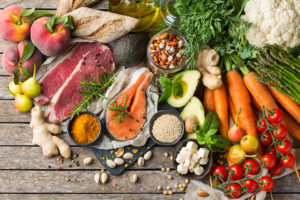
Inflammation is a term we hear often in the health field, but what does it really mean? Why is it important to care about?
The first thing you might think of is pain and redness from an injury or achy joints. This is a real and helpful role of inflammation in our body. It helps alert us to problems.
The swelling and redness is a sign the body is working to bring all the necessary immune cells to repair the injury.
This is known as acute or short-term inflammation. It’s necessary for healing.
Chronic or long-term inflammation, however, can wreak havoc on our bodies. The inflammatory process is left on for a long time and it can actually cause more harm than good by damaging healthy cells.
What leads to chronic inflammation?
Some of the top culprits:
- Being overweight
- Smoking
- Stress
- Poor sleep
- Environmental toxins/chemicals
- Diets high in sugar and processed foods
What are the dangers of chronic inflammation?
Chronic inflammation has been linked to a host of diseases, including:
- Diabetes
- Heart disease
- Certain cancers
- Arthritis
- Asthma
- Ulcers
- Gastrointestinal disorders
- Auto-immune diseases
- Alzheimer’s
- Food intolerances
Which foods can help or hinder inflammation?
The top foods to help reduce inflammation—foods that quench the fire—are found in anti-inflammatory diets such as the Mediterranean diet. These include:
- Healthy fats—Olive oil, nuts, seeds, avocado, fatty fish
- Carotenoids—Carrots, squashes, dark leafy greens, tomatoes, sweet potato, peppers, citrus fruits
- Flavonoids—Berries, grapes, red onions, purple cabbage, apples, dark chocolate, tea, red wine, soy
- Spices and Herbs—Parsley, cinnamon, oregano, thyme, peppermint
Foods that increase inflammation, or fuel the fire, include:
- Fried foods—French fries, chicken tenders, chips, fried chicken, mozzarella sticks
- Sugar—Candy, pop, juice, lemonade, Kool-aid, desserts, ice cream, sports drinks, breakfast cereals, syrup
- Red/processed meat—Beef, pork, bacon, sausage, pepperoni, salami, ribs, hot dogs, bologna, brats
- Saturated and trans fats—Butter, cheese, fatty meat, margarine, shortening, baked goods, non-dairy coffee creamer
- Refined (white) flour—Enriched flour, white bread, most crackers, pretzels, donuts, cakes, cookies, white buns or bagels, breakfast cereals
- Alcohol in excess

 /a>
/a>
 /a>
/a>
 /a>
/a>